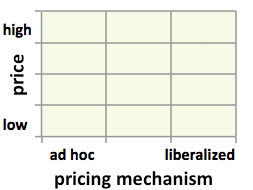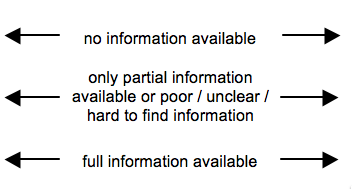Difference between revisions of "Fuel Prices Niger"
***** (***** | *****) |
***** (***** | *****) |
||
| Line 1: | Line 1: | ||
{{Fuel Price Factsheet | {{Fuel Price Factsheet | ||
|Fuel Price Country=Niger | |Fuel Price Country=Niger | ||
| − | |Fuel Pricing Policies="Prices have been uniform throughout the country since Aug 2001. Beginning in Jan 2012, gasoline and diesel prices are set by a ministerial decree. Prices were adjusted once in 2009 and 2010, and four times in 2011. In Jan 2012, prices of all fuels except kerosene were lowered, and | + | |Fuel Pricing Policies="Pricing policy: Prices have been uniform throughout the country since Aug 2001. Beginning in Jan 2012, gasoline and diesel prices are set by a ministerial decree. Prices were adjusted once in 2009 and 2010, and four times in 2011. In Jan 2012, prices of all fuels except kerosene were lowered, and were not adjusted for the rest of the year. In Jan 2013, the prices of gasoline and diesel were lowered, while kerosene and LPG prices did not change. An energy fund, created in 1994, has taken a few francs a liter from gasoline and diesel and cross-subsidized LPG. Fuel subsidies amounted to US$29 million in 2009 (0.5% of GDP), US$61 million in 2010 (1.1% of GDP), and US$70 million in 2011 (1.2% of GDP). With the start-up of oil production and refinery operation in 2011, explicit fuel price subsidies were eliminated in 2012 (source IMF). |
| + | Protests: The start-up of the refinery in Nov 2011 raised expectations about dramatic reductions in the prices of petroleum products. When the reductions did not occur, protests broke out against the high cost of living and turned violent in Dec 2011. Government in Jan 2012 in response increased civil service pay by 5–10% and reduced electricity tariffs by 25% and water by 5%. | ||
| + | |||
| + | Information: SONIDEP (Nigerien Petroleum Products Company) posts current and historical prices going back to 2001 on its Web site." | ||
(Source: Kojima, Masami. (2013, forthcoming). “Petroleum product pricing and complementary policies:Experience of 65 developing countries since 2009.” Washington DC: World Bank.) | (Source: Kojima, Masami. (2013, forthcoming). “Petroleum product pricing and complementary policies:Experience of 65 developing countries since 2009.” Washington DC: World Bank.) | ||
Revision as of 12:05, 26 March 2013
Part of: GIZ International Fuel Price database
Also see: Niger Energy Situation
Fuel Pricing Policies
| Local Currency: | FCFA |
| Exchange Rate: | 472.9
|
| Last Update: |
"Pricing policy: Prices have been uniform throughout the country since Aug 2001. Beginning in Jan 2012, gasoline and diesel prices are set by a ministerial decree. Prices were adjusted once in 2009 and 2010, and four times in 2011. In Jan 2012, prices of all fuels except kerosene were lowered, and were not adjusted for the rest of the year. In Jan 2013, the prices of gasoline and diesel were lowered, while kerosene and LPG prices did not change. An energy fund, created in 1994, has taken a few francs a liter from gasoline and diesel and cross-subsidized LPG. Fuel subsidies amounted to US$29 million in 2009 (0.5% of GDP), US$61 million in 2010 (1.1% of GDP), and US$70 million in 2011 (1.2% of GDP). With the start-up of oil production and refinery operation in 2011, explicit fuel price subsidies were eliminated in 2012 (source IMF). Protests: The start-up of the refinery in Nov 2011 raised expectations about dramatic reductions in the prices of petroleum products. When the reductions did not occur, protests broke out against the high cost of living and turned violent in Dec 2011. Government in Jan 2012 in response increased civil service pay by 5–10% and reduced electricity tariffs by 25% and water by 5%.
Information: SONIDEP (Nigerien Petroleum Products Company) posts current and historical prices going back to 2001 on its Web site."
(Source: Kojima, Masami. (2013, forthcoming). “Petroleum product pricing and complementary policies:Experience of 65 developing countries since 2009.” Washington DC: World Bank.)
Fuel Prices and Trends
| Gasoline 95 Octane | Diesel | |
|---|---|---|
| in USD* |
|
|
| in Local Currency |
|
|
* benchmark lines: green=US price; grey=price in Spain; red=price of Crude Oil
Fuel Price Composition
Price composition.
No information available.
At a Glance
| Regulation-Price-Matrix |
| ||||
 |

|

|

| ||
Sources to the Public
| Type of Information | Web-Link / Source |
|---|---|
| Pump prices and margins | http://www.sonidep.net/index.php?option=com_content&view=article&id=62&Itemid=61 (Historic prices 2001 - 2013, monthly data) |
| Pump prices and margins | http://www.sonidep.net/ |
Contact
Please find more information on GIZ International Fuel Price Database and http://www.giz.de/fuelprices
The following coordinate was not recognized: {{#geocode: Niger|google }}.



















